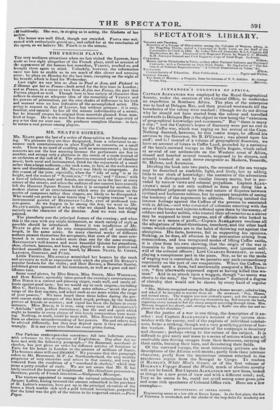MR. NEATE'S SOIREES.
MR. NEATE gave the last of a series of three soirees on Saturday even- ing. We presume they are thus designated, from a reluctance to an- nounce such entertainments in plain English as concerts, on a small scale. There is no need of avoiding such an announcement ; for these concerts are not the less amusing because the performers are few in number, and occupy only a platform in the centre of a room instead of an orchestra at the end of it. The selection consisted solely of chamber music, both vocal and instrumental, fitted for the enjoyment of a small rather than a large audience,—for such a one, in fact, as the well-known taste and discrimination of Mr. NEATE was likely to congregate. At this season of the year, especially, when the " tide of song" is at its height, and the names of " SCIIRCEDER," " PASTA," and " Gals," with a host of inferiors, male and female, are staring us in the face at every corner of the streets, and when the auditors of one concert have scarcely left the Hanover Square Rooms before it is occupied by another, the modest claims of an entertainment which rests its attraction on the merits of composers rather than singers, are likely to be disregarded. Who would riot prefer to hear Gaisi sing " La vergine vezzosa" to an instrumental quintet of BEETHOVEN ?—few, even of professed con- cert-goers. As we happen to be among the few, we went to Mr. NEATE'S soiree, ignorant of who or what we should hear, but relying entirely on the character of the director. And we were not disap- pointed. The pianoforte was the principal feature of the evening; and when this is the case with any single instrument, as much variety of style as possible should be introduced. Hence it was injudicious of Mr. NEATE to give two of his own compositions, each of considerable length, in the same soirée. So many classical works of different authors present themselves for acceptance, that even of the most cele- brated it is unwise to select more than one for the same evening. BEETHOVEN'S well-known and most beautiful Quintet for pianoforte, oboe, clarinet, bassoon, and horn, was played with a more perfect and finished ensemble than we ever heard, by Messrs. NEATE, G. CooKE, LAZARUS, GODFREY, and Puzzi.
Little THERESA MILANOLLO astonished her hearers by the truth and accuracy as well as expression with which she played DE BERIOT'S popular fantasia for the violin ; and Herr BOEHM, a Bavarian flautist, exhibited great command of his instrument, as well as a pure and mel- lifluous tone.
Some vocal pieces, by Miss BIRCH, MISS SMITH, MISS WOODHAM, and Herr KROFT, agreeably interspersed the evening's entertainment. Miss BIRCH is a correct and pleasing singer, reads well, and rarely of- fends against good taste : but we would say to such singers—including Miss C. Novel to, Miss BRUCE, and some others—" avoid the great songs of the first masters, and select such as are more within the range of your powers." We have heard these three ladies during the pre- sent season make attempts of this kind, urged, perhaps, by the foolish praises of friends or masters ; and signal has been the failure in every instance. Miss Buten, it is true, sung every note of BEETHOVEN'S
"Adelaide" with perfect correctness ; but the soul and spirit which ought to breathe in every phrase of this lovely composition were want- ing. Nothing, in truth, could be more dull. Miss Bitten failed simply
from an obvious misunderstanding of her powers. She and others may be advised differently, but they may depend upon it they arc advised wrongly. It is not every miss that can enact prima donna.


























 Previous page
Previous page